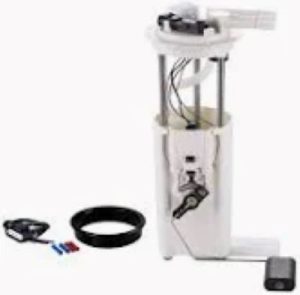One of the primary purposes of the fuel pump is to move fuel from the tank to the engine so that your car can run smoothly. This, in turn typically 30 to 80 psi worth of pressure moves fuel through the fuel lines and into the injectors. The fuel injectors subsequently break down the gasoline into just enough proportions to burn. An engine that is not making the proper amount of power because there is not enough pressure leads to things like misfires and hesitation. Fuel pumps that are able to support bigger injectors and flow better, race cars even more fuel …
This is opposed to mechanical fuel pumps that keep the same pressure, usually at 3-9 psi or higher when they are working properly, as a result of operating off of engine speed. When the fuel pump goes bad, you may experience engine stalling or hard starting, and repair is normally priced around $400 to $600 depending in the car's brand and model. For these cases, the aftermarket has options like this approach offered by Kemso with performance fuel pumps that flow higher amounts of fuel, and it is useful when you work to deliver more power in your coffers.
A fuel pressure regulator which in some vehicles works with the pump to adjust the pressure given each engine need. At idle, low fuel pressure is acceptable, but with the throttle mashed to the floor deluxe fuel delivery becomes a must-do. It is critical for achieving best fuel economy — which could differ by 10-20% depending on how well the fuel pump operates.

This fuel pump may have a varying lifespan depending on what kind of driving environment it is used in, as well as the quality of fuel being pumped. Most pumps are good for 100,000 to 200,000 miles or more—some have even been proven to endure the life of the vehicle when contaminated fuel is not introduced and filters aren't allowed to become clogged. Normal service as an example some Gas filters are purged every 30000 miles to 50000 km of it is intended limits that help guarantee not just the pump carry on working at its engine performance limit but even protect against overburdening any OE Fuel Pumps. How To Tell When The Fuel Pump Is FailingKenburnsGoing bad torchvisionkate fuckin mckinnon86Replies TrendingquestionsIf you ask, "How does a fuel pump work in the car?" the response is loss of electrical power, decreased gas mileage and potentially, full engine failure.
Fuel pumps are also beefed up to meet the greater fuel demands of racing and other high-performance scenarios. For example, Kemso offers high-flow fuel pumps rated to more than 500 horsepower so the engine can ingest as much fuel as it needs even when at wide-open throttle. Their designs are meant to meet tough standards for durability and precision, which is necessary for fuel delivery at speeds they encounter.
For more detailed information about fuel pump technology, performance specs and available products please feel free to visit Kemso Fuel Pump Shop and you will find a wide selection of high-quality products for all OE replacement, standard and even performance applications.